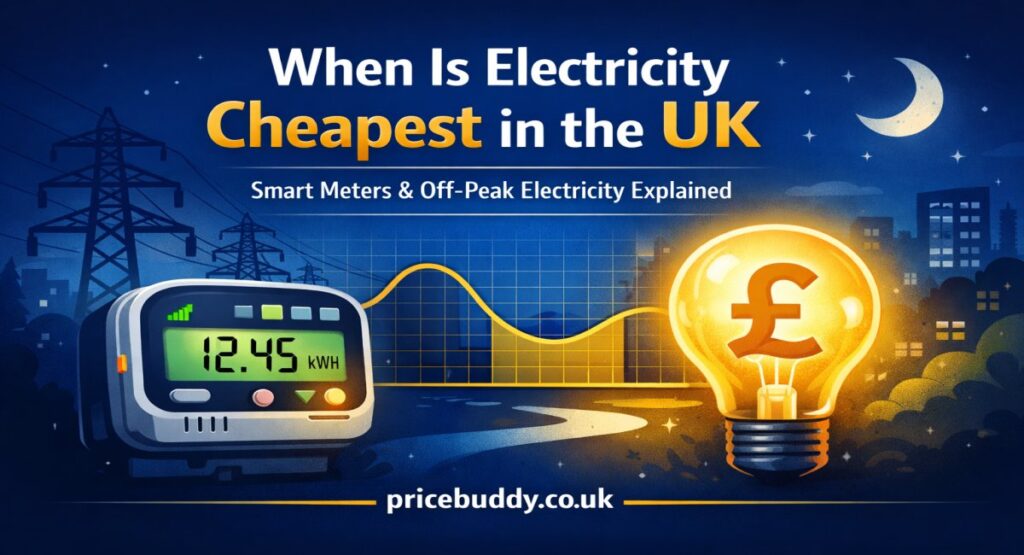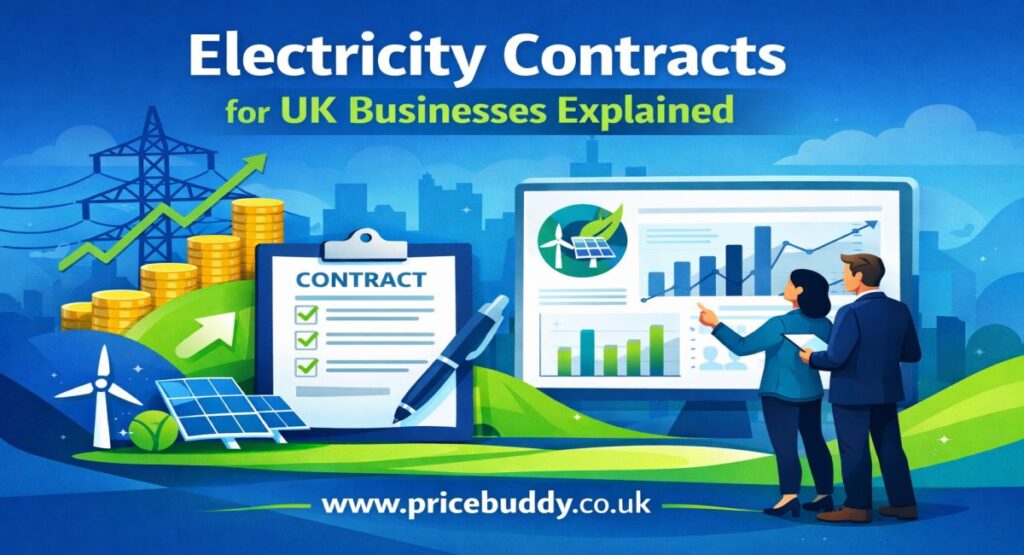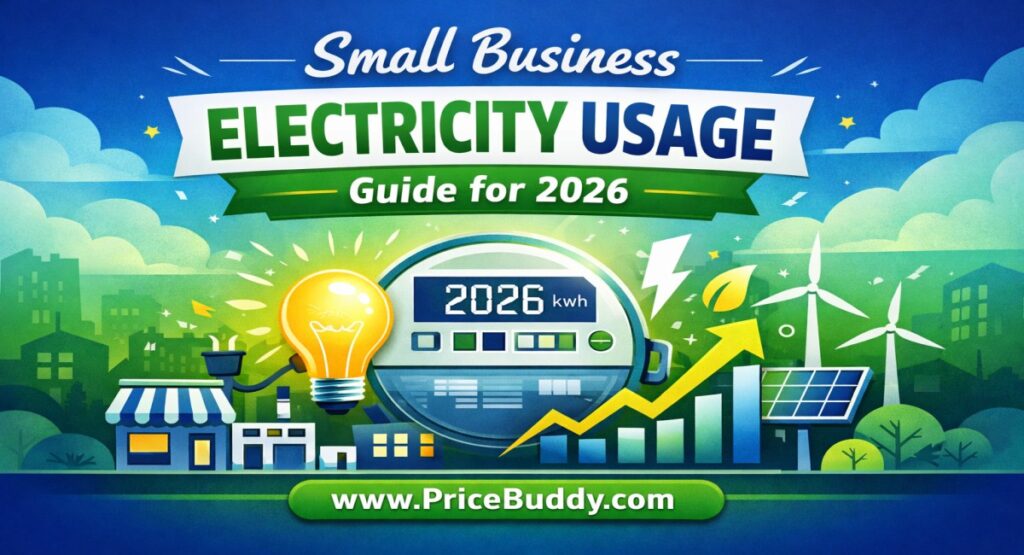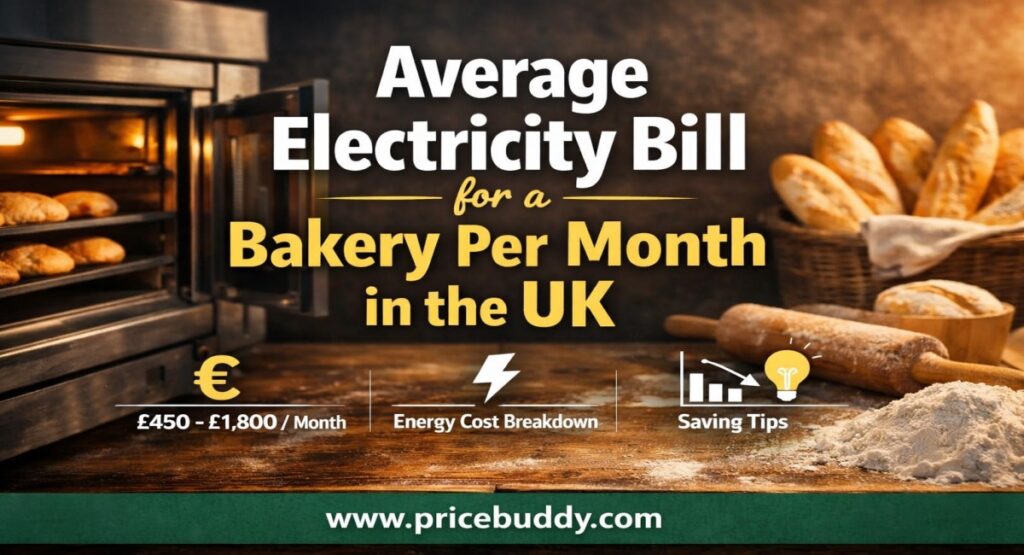It is more crucial than ever to comprehend the price of business electricity in the current difficult energy market. Common misconceptions and false information are causing many UK businesses to overpay for their energy. These misconceptions keep businesses from negotiating the best prices, from hidden expenses to deceptive tariff options. This post will dispel the five most common misconceptions about electricity costs and teach you how to compare providers, save money, and make more informed energy choices.
At Price Buddy, we assist UK companies in obtaining the best prices, avoiding expensive errors, and staying ahead of the curve in the marketplace. Together, we can dispel these myths and help your company save money and prosper.
Small Business Electricity Prices – What You Really Pay

Electricity costs for small businesses are frequently higher per unit than those for households. The first step to cost control is comprehending your bill breakdown.
Many business owners believe that small businesses pay less for electricity than households. The opposite is actually true. Although businesses may benefit from other benefits like flexible contracts and reclaimable VAT, small business electricity prices are usually higher per kilowatt-hour when compared to domestic tariffs.
Typical bills consist of:
Unit Rate (p/kWh): The price per unit of electricity used is known as the unit rate (p/kWh).
Standing Charge (daily fee): A set daily price to pay for supplies and upkeep.
VAT (20% for most businesses): Unless exempt, VAT (20% for most businesses) is applied.
Climate Change Levy (CCL): Unless your company is eligible for relief, the Climate Change Levy (CCL) is a tax on energy use.
Compare Business Electricity Prices – Busting the Myths
Businesses can reduce their annual electricity costs by up to 45% by comparing prices. During your contract, don’t assume that switching will be difficult or impossible.
The idea that comparing energy providers is pointless is among the most widespread misconceptions. Many owners think that switching suppliers requires a lot of paperwork or that all suppliers offer about the same prices. Both presumptions are incorrect.
Myth 1: “Until your contract expires, you cannot switch.”
Reality: Within a year of their renewal date, businesses can begin comparing prices. Costly rollovers onto default tariffs are avoided by locking in new rates early.
Myth 2: “There won’t be much of a difference in comparison.”
Reality: Regularly comparing business electricity prices can reduce annual costs by 20–45%, according to industry data. Getting the right tariff at the right time is crucial because energy markets are still erratic.
Myth 3: “It Takes Too Much Time”
Reality: The procedure usually takes less than half an hour when using online tools and brokers. From obtaining quotes to negotiating contracts, we at Price Buddy take care of everything.
Cheap Business Electricity Prices – Fact vs Fiction
Cheap business electricity costs don’t always translate into the best deal. Just as important as the pence per kWh are standing fees, contract conditions, and tariff type.
It’s easy to concentrate solely on the lowest unit rate when looking for affordable business electricity rates. However, inexpensive does not always equate to cost-effective.
Hidden Costs Behind Cheap Tariffs
- Low unit rates may be offset by high standing charges.
- Strict penalties for early termination may be included in contracts.
- Unused capacity may be reimbursed to seasonal businesses.
For instance:
- Tariff A: 24 p/kWh, daily standing fee of 55 p
- Tariff B: 40p per day for a standing charge, 26p per kWh
Despite the higher unit rate, Tariff B is ultimately less expensive for a company that uses 8,000 kWh annually.
At Price Buddy, we emphasize the value of looking at the big picture instead of pursuing deceptively “cheap” offers.
Best Business Electricity Prices UK – How to Find Them

By comparing fixed, variable, and renewable tariffs and matching them to your company’s requirements, you can find the best business electricity prices in the UK.
You must focus on suitability and look past marketing slogans if you want to get the best business electricity prices in the UK.
Types of Business Tariffs
Rates are locked in for one to three years with fixed tariffs. Excellent for creating a budget in erratic markets.
Variable Tariffs: Prices are based on the trends of the wholesale market. Good if you think expenses will decrease.
Renewable Tariffs: Ideal for companies with sustainability objectives, but a little higher.
No Standing Charge Tariffs: This option may be suitable for businesses with low usage or seasonality.
How to Get the Best Prices:
Examine Your Use: Recognize when demand is at its highest and how much energy you use.
Compare Quotes from Several Suppliers: Don’t depend on a single quote.
Choose the Right Tariff Type: Select between a fixed, variable, renewable, or no-standing-charge tariff.
Time to Lock in: The cost of wholesale energy varies. Every year, locking in during a dip can save thousands of dollars.
Collaborate with an Experienced Broker: Price buddy bargains for special prices that aren’t always accessible directly.
Best Price Electricity for Business – Smart Strategies
Combining smart usage, audits, and government incentives can result in the best electricity price for businesses, not just the lowest tariff.
Selecting the appropriate tariff and cutting back on wasteful use are both necessary to find the best electricity price for a business.
Effective Smart Strategies
Conduct an Energy Audit: Find waste and inefficient equipment by conducting an energy audit.
Use Smart Meters: Employ smart meters to track usage trends and make necessary adjustments.
Upgrade Your Equipment: Long-term expenses can be reduced with LED lighting and energy-efficient appliances.
Lock In Prices: Get a fixed deal right away if projections indicate that wholesale costs will rise.
Utilize Incentives: Look into government-sponsored programs that assist small and medium-sized businesses in implementing green technologies.
Businesses can save thousands of dollars a year by combining smarter tariffs with efficient consumption.
UK Policy and Market Outlook

The UK business electricity market is changing as a result of government policy changes, such as lowering green levies and introducing support programs.
The energy policy of the UK is changing quickly. The government unveiled a £2 billion plan in 2025 to cut energy costs for energy-intensive industries by up to 25% by 2027. In order to assist SMEs and manufacturers, green levies may also be lowered.
What This Signifies for Companies
Short-Term Relief: So, me reductions in non-commodity charges (levies, policy costs) provide short-term relief.
Long-Term Stability: Increased integration of renewable energy sources may mitigate fluctuations in wholesale prices.
Benefits for SMEs: Efficiency grants and reduced grid costs may provide indirect benefits to SMEs, even though large industries receive the largest discounts.
Every day, we at Price Buddy keep an eye on policy changes to make sure our clients are always ahead of the curve.
Quick Tips to Save on Business Electricity Prices
Reduce waste, fix when needed, and compare frequently to save money on business electricity costs.
- At least three to six months before renewal, compare suppliers.
- Select the tariff based on your usage habits.
- Utilize motion sensors and timers to reduce wasteful use.
- Educate employees on energy-saving techniques.
- For individualized guidance, stay informed with Price Buddy.
Frequently Asked Questions
Q1: Are business electricity prices cheaper than domestic?
No. Although business rates are frequently more expensive per unit than domestic tariffs, they typically include flexible contracts and VAT that can be refunded, which can help defray expenses. Customized tariffs that better reflect their usage trends are also advantageous to businesses.
Q2: Can small businesses switch suppliers easily?
Yes. With little paperwork, small businesses can make the switch to the internet in less than an hour. A more seamless process and the most affordable small business electricity rates are guaranteed when a reliable broker is used.
Q3: How often should I compare business electricity prices?
Ideally, six months before the renewal of your contract, but at least once a year. You can lock in the best business electricity prices in the UK before market rates increase by regularly comparing.
Q4: What’s the best tariff type for SMEs?
Budgeting is made easier by fixed tariffs, which typically offer the most stability in erratic markets. However, if their usage is flexible or they prefer greener options, some SMEs might benefit from variable or renewable tariffs.
Q5: Can I get cheap business electricity prices without long contracts?
Yes, but compared to longer-term contracts, short-term agreements might have higher rates or more stringent terms. To make sure the tariff actually offers low business electricity prices, always figure out the total annual cost.
The Truth About Business Electricity Prices
The fact is straightforward: a lack of awareness and antiquated myths cause many UK businesses to pay more than they ought to. Your business can drastically cut its energy expenses by learning how to compare prices, avoiding deceptive “cheap” offers, and keeping up with changes to the law.
Our goal at Price Buddy is to provide transparent, customized solutions to help businesses access the best business electricity prices in the UK. Take charge of your energy bills by comparing now and avoiding being duped.











